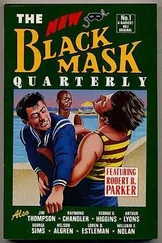‘In my part of the country we don’t law them,’ Luke boasted.
‘We aint in your part of the country,’ Fort pointed out. ‘Got the rent up?’
‘It’s three-thirty a week for the set of us,’ Luke explained as if the question had been asked of Dove.
‘That comes to one-ten a week,’ Fort broke the figure down for everybody present.
‘Agreeable to me,’ Dove accepted the alcove and went to try out his cot. ‘I don’t suppose you fellows got a yaller yam to spare?’
‘Nary a yam, son.’
‘Wall, I just had a hankerin’.’
He heard Fort and Luke bickering about the last week’s rent, but listened only absent-mindedly. His right buttock still burned where the mosquito had gotten him. He rubbed the spot while waggling his tooth, till sleep stopped waggle, rub and hankerin’.
Fort looked like an ice-house horse mistakenly entered in a claiming race, then insulted publicly for not winning.
All his life he had been lapped by competition too fast for an ice horse. All his life he had been outclassed. Therefore no failure had been his own. How could a man who had never had a proper start be blamed for anything?
Worse, nobody would listen to Fort’s side of the story. How all the good times had passed Fort by, the love and the high living. ‘Watch out for yourselves after this,’ he warned all men, ‘I’m takin’ care of Number One.’
Yet moments of melancholy touched him when he realized that, somewhere, some deserving girl with a steady job was being deprived of him every day. He had tried, through lonely hearts columns, to help her to find him. But the columns had turned out to be taken up mostly by spongers advertising for somebody to support them.
What was the use of a world that failed to reward the deserving while heaping all manner of goodies on people who ought simply be given a kick in the teeth and sent flying? Someone just hadn’t been paying attention was how things looked to Fort.
He had ruined himself over and over for the sake of others and not one yet had said, ‘Thank you, goodbuddy.’ Forty years of selfless devotion to humanity had brought him no more than the faded cotton on his back.
Actually, those thin and rubbery lips had begun taking care of Number One with the first tug of his pinewood mother’s teat. And had lactated every available nipple since. ‘That was a real smart woman,’ Dove heard him talking in his sleep – ‘she gave me twenty dollars.’
That was how Fort had gone about making others happy. That was why, when teats ran dry and orange groves froze and shoe-soles flapped he could feel himself so terribly wronged.
And could bear his cross so mournfully, a sort of Kiwanis Christ in a Bing Crosby shirt, resigned to insult and injury, without a shred of larceny and incapable of imposing his woes on others. In fact, he told Dove so: ‘I’m not the kind to burden others with my troubles. Nobody will know from these sufferin’ lips through what Old Fort have went.’
Then play by play revealed through just what Old Fort had went.
However self-deluded, he wasn’t much deluded about New Orleans. ‘It’s just scratchin’ a pore man’s ass to try to make a living in this town,’ he informed Dove right off. ‘This town’ll starve you to death. I’m a mechanic, a cook, I can drive a truck or cab, I play the gee-tar and I can keep books for anybody. I made twenty cents yesterday and a nickel the day before and that’s doing better than a good many. A man can live on a dollar a day like Hoover tells him he got to – but where’s he to get the dollar?’
‘It’s a hard git-by,’ Little Luke cut in, ‘but what have a man got to lose by leading a Christian life? What if he don’t get rich but just poor-hogs it all his days? He still got a high place in the Kingdom comin’, aint he? Rich or poor don’t matter – Heaven apportion its awards accordin’ each man to his merit as I look at it.’
‘I guess everyone get exactly what he got comin’,’ Dove agreed, ‘but I aint old enough to vote myself and don’t think I will till I am.’
Fort had come out of the ’gator backlands to Coral Gables just as the beaches were being prepared for the boomer and the shark. Boomers and shark already lolled the palmetto sands. ‘Makin’ any money?’ they asked instead of ‘good morning.’
Fort had wandered among them looking for another Southern boy, but every face he saw wore the same obscene ‘N.Y.’
‘Makin’ any money?’
He had stood bent and sweating over oven and stove, plying the frycook’s fearsome trade, while New Yorkers got suntanned with girls half their ages a hundred yards away.
Soiled and baked by grease and sweat, still bent but beyond sweating, when waiters swung through the kitchen door, he glimpsed boomer and shark once more. Now they had changed to evening clothes and their girls to sleeveless satin. On the damask white as snow, dark wine or light looked equally cool.
One night an order had come back – ‘Not done enough,’ and had then been returned once again – ‘now it’s too well done.’ He had heard the metallic ring of laughter right out of downtown Gomorrah.
Between the dark wine and the light on damask white as snow.
Fort had that pinewood prurience that made him feel that going half-naked into the sea, even in the summer night’s sheltering dark, was ‘lewdling.’ So when he went wading into the midnight waters he wore long winter underwear. He felt safer, somehow, that way. Fort was afraid of all open waters.
He only went in far enough to let it spill through his palms and was careful not to splash. High overhead the bright windows paid for in Yonkers and the Bronx were filed one above the other. Oh, he knew what they were up to behind the shades all right.
O you smiling, treacherous girls, blouses unbuttoned and skirts unzipped, lolling up there in your bed lamps’ joy, saying ‘Maxie, play with me just right,’ while some king of the garment trade undressed her garment by garment. Hotel Sodom – that was what it ought to be called. To think of Christian girls, good Southern girls, daughters of families who remembered Shiloh and Atlanta naked up there in the arms of hairy brown thieves from Babylon. The giraffe-like man in the sea spilled Southern waters from palm to palm. In his heart burned all Atlanta.
Back in the windowless frycook’s quarters he froze one minute and sweated the next. He saw himself wheeling a Stutz – it was always a Stutz. And the wind that went by lifted the skirt of the slender blonde girl beside him so high he reached his big hand out – ‘ Makin’ any money? ’ she taunted him, and then there was no one at all on the seat beside him. Indeed, there was no seat beside him. Only a soiled pillow too hot to touch and the morning light seeping in from the hall that led one-way to the kitchen.
‘ Makin’ any money? ’ the chef had asked as soon as Fort had tied his apron that morning.
‘ Makin’ any money? ’ was the last thing Fort had heard that night.
He had learned to command the easy credit of that day and rushed, with other thousands there, to lay hand on anything of earth or steel or stone whose value would be enhanced as soon as a city would be built up about it. Though not a street had yet been cut from swamp, everyone knew the metropolis would soon rise and held stubbornly onto their pieces of earth or stone though offered fifty times their worth. Why give fortunes to strangers? Land that had sold for two dollars an acre went for three hundred. Business lots worth two thousand came to be worth a hundred thousand. Lots remote from any business district were reckoned business lots. Farmlands worth fifty dollars an acre became ‘subdivisions’ and were held for ten thousand per acre – ‘in a couple years this will be downtown.’
Читать дальше












